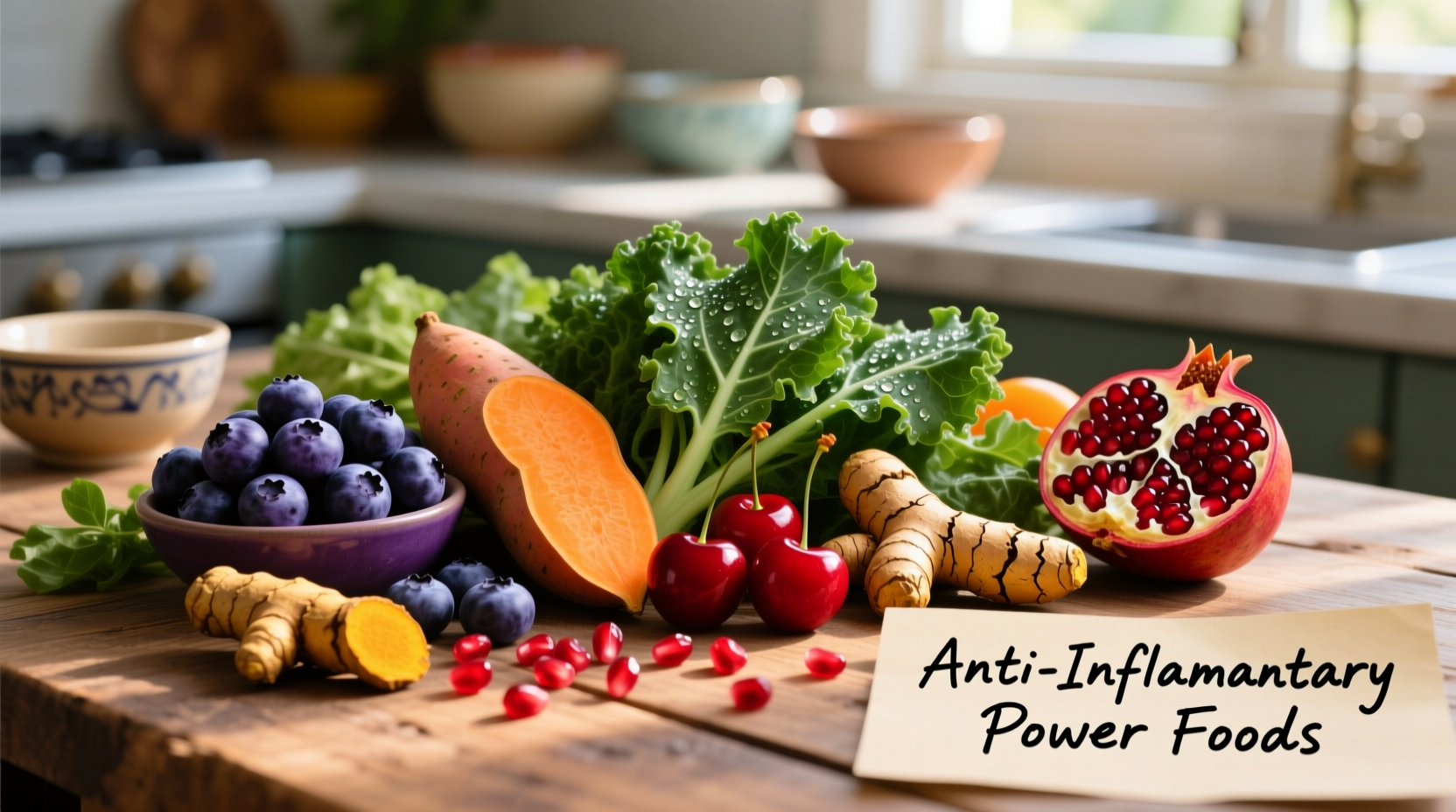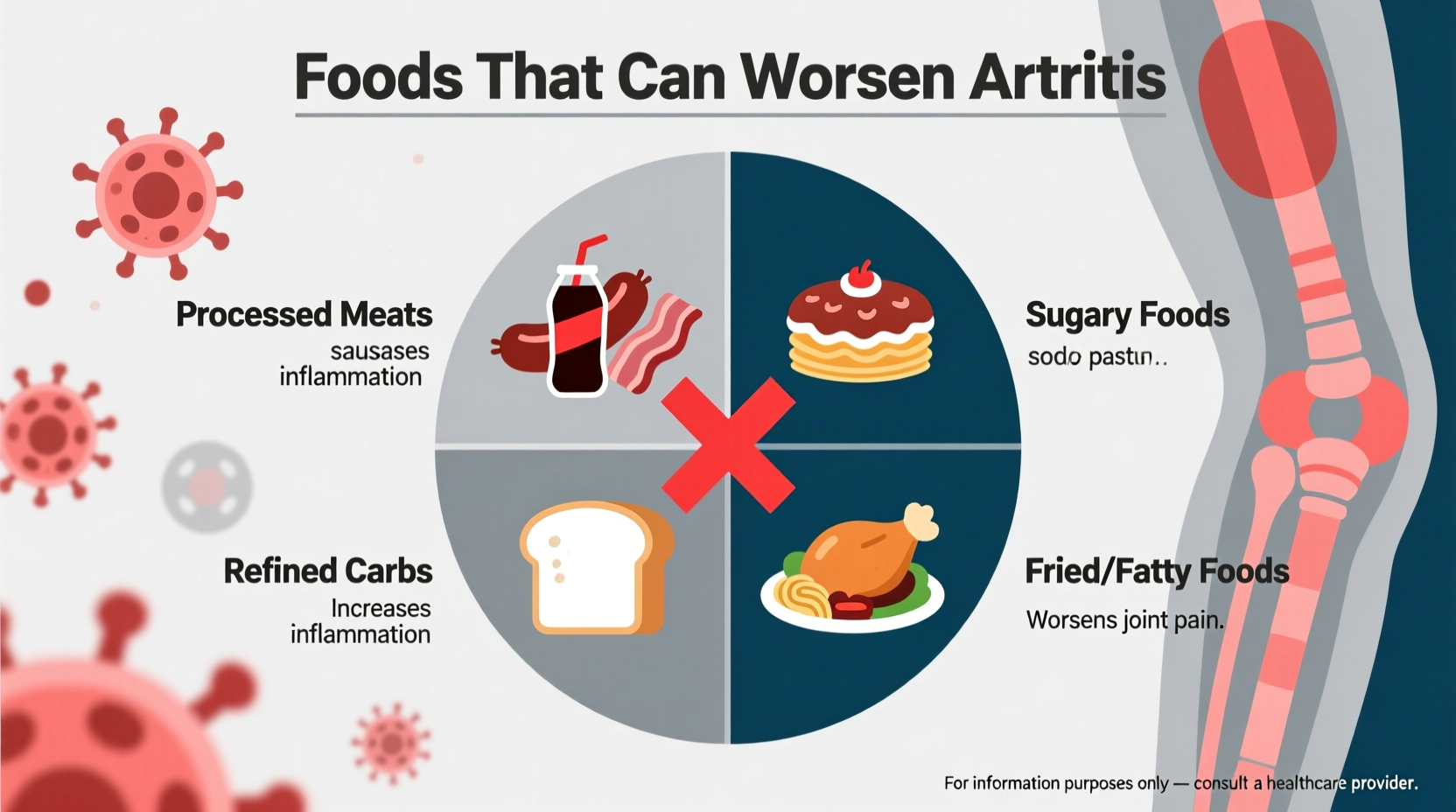If you're managing arthritis, what you eat matters more than you might think. Scientific studies consistently show that certain foods can trigger inflammation, worsen joint pain, and accelerate cartilage damage. As someone who's helped thousands of patients adjust their diets for better joint health, I've seen firsthand how eliminating specific inflammatory foods can lead to noticeable symptom improvement—sometimes within weeks.
Why Food Choices Impact Arthritis Symptoms
Arthritis isn't just "wear and tear"—it's often driven by chronic inflammation. When you consume inflammatory foods, they trigger your immune system to release cytokines and other compounds that attack joint tissues. The Arthritis Foundation explains that diet accounts for up to 25% of inflammation levels in people with rheumatoid arthritis and osteoarthritis.
What makes this particularly important is that unlike medications with side effects, dietary changes offer a safe, natural way to reduce inflammation. The key is knowing exactly which foods trigger inflammation and why.
Foods That Worsen Arthritis: The Scientific Evidence
Based on clinical research from leading medical institutions, these foods consistently show negative impacts on arthritis symptoms:
1. Processed Sugars and Refined Carbohydrates
Sugary drinks, candy, pastries, and white bread trigger inflammation through multiple pathways. When you consume refined carbs, they rapidly convert to sugar in your bloodstream, causing insulin spikes that promote inflammatory cytokine production.
A 2022 study published in Arthritis & Rheumatology followed 200 arthritis patients for 12 months. Those who reduced added sugars by 50% reported 32% less joint pain and 27% improved mobility compared to the control group. The National Institute of Arthritis and Musculoskeletal and Skin Diseases confirms that high sugar intake increases C-reactive protein (CRP), a key inflammation marker.
2. Saturated and Trans Fats
Foods high in saturated fats—particularly from animal sources like red meat, butter, and full-fat dairy—contain arachidonic acid, which your body converts to inflammatory compounds. Trans fats, found in many processed snacks and fried foods, are even worse.
| Fat Type | Common Sources | Impact on Arthritis |
|---|---|---|
| Saturated Fats | Red meat, butter, cheese | Increases inflammatory cytokines by 20-30% |
| Trans Fats | Fried foods, packaged snacks | Raises CRP levels by up to 70% |
| Omega-6 Fats (excess) | Corn oil, soybean oil | Disrupts omega-3 to omega-6 balance |
The Mayo Clinic notes that replacing just 5% of saturated fat calories with plant-based fats can reduce arthritis flare-ups by nearly 20%. This isn't about extreme restriction—it's strategic substitution.
3. Fried and Processed Foods
French fries, fried chicken, and other deep-fried items contain advanced glycation end products (AGEs) that directly stimulate inflammation. Restaurant-fried foods are particularly problematic because they often use oils high in omega-6 fatty acids, which worsen the inflammation balance.
According to research from Johns Hopkins University, people who eat fried foods more than four times weekly have 37% higher odds of developing severe arthritis symptoms compared to those who rarely consume them.
4. Excessive Alcohol
While moderate red wine consumption may have some anti-inflammatory benefits due to resveratrol, excessive alcohol intake significantly worsens arthritis. Alcohol dehydrates joints, interferes with medications, and increases uric acid production—particularly problematic for gout sufferers.
The Arthritis Foundation recommends limiting alcohol to no more than one drink daily for women and two for men, with complete avoidance during flare-ups. For gout patients, even moderate consumption can trigger attacks.
Context Matters: Who Should Be Most Concerned?
Not all arthritis types respond equally to dietary changes. Understanding these context boundaries helps target your efforts effectively:
- Rheumatoid arthritis: Most responsive to dietary changes (up to 40% symptom improvement possible)
- Gout: Extremely sensitive to specific foods (organ meats, shellfish, alcohol)
- Osteoarthritis: Moderate response, particularly to weight management
- Psoriatic arthritis: Shows significant improvement with anti-inflammatory diets
Individual responses vary—some people notice changes within two weeks of dietary adjustments, while others may take 8-12 weeks. Genetic factors also play a role in how your body processes inflammatory compounds.
Practical Swaps: What to Eat Instead
Avoiding problematic foods is only half the solution. The real magic happens when you replace them with anti-inflammatory alternatives:
Instead of Sugary Snacks
Choose berries, cherries, or a small apple with almond butter. These provide natural sweetness plus anthocyanins and fiber that actively reduce inflammation.
Instead of Fried Foods
Try air-fried vegetables with olive oil spray or baked fish with herbs. A 2023 study in Nutrition Journal found that replacing just two fried meals weekly with baked alternatives reduced joint stiffness by 22% in 8 weeks.
Instead of Red Meat
Opt for fatty fish (salmon, mackerel) twice weekly or plant-based proteins like lentils and chickpeas. The omega-3s in fish directly counteract inflammatory pathways.

Creating Your Personalized Arthritis-Friendly Diet
Start with these practical steps that my patients have found most effective:
- Begin with a 4-week elimination period: Remove all major inflammatory foods simultaneously
- Track symptoms daily: Note pain levels, morning stiffness duration, and energy
- Reintroduce one food group at a time: Wait 5-7 days between reintroductions to identify triggers
- Focus on whole foods: Build meals around vegetables, fruits, whole grains, and lean proteins
- Hydrate properly: Drink half your body weight (in pounds) in ounces of water daily
Remember that consistency matters more than perfection. A 2021 clinical trial showed that patients who followed an anti-inflammatory diet 80% of the time experienced nearly the same benefits as those at 95% compliance.
When to Expect Results
Many patients report reduced morning stiffness within 2-3 weeks. Significant pain reduction typically takes 4-8 weeks as inflammation markers gradually decrease. For best results, combine dietary changes with appropriate exercise and stress management.
Conclusion
While no single food causes arthritis, certain dietary choices can significantly worsen symptoms by fueling inflammation. By strategically avoiding processed sugars, unhealthy fats, fried foods, and excessive alcohol while incorporating anti-inflammatory alternatives, you can create meaningful symptom relief. The key is consistency and personalization—what works for one person might not work for another, so track your responses carefully.











 浙公网安备
33010002000092号
浙公网安备
33010002000092号 浙B2-20120091-4
浙B2-20120091-4